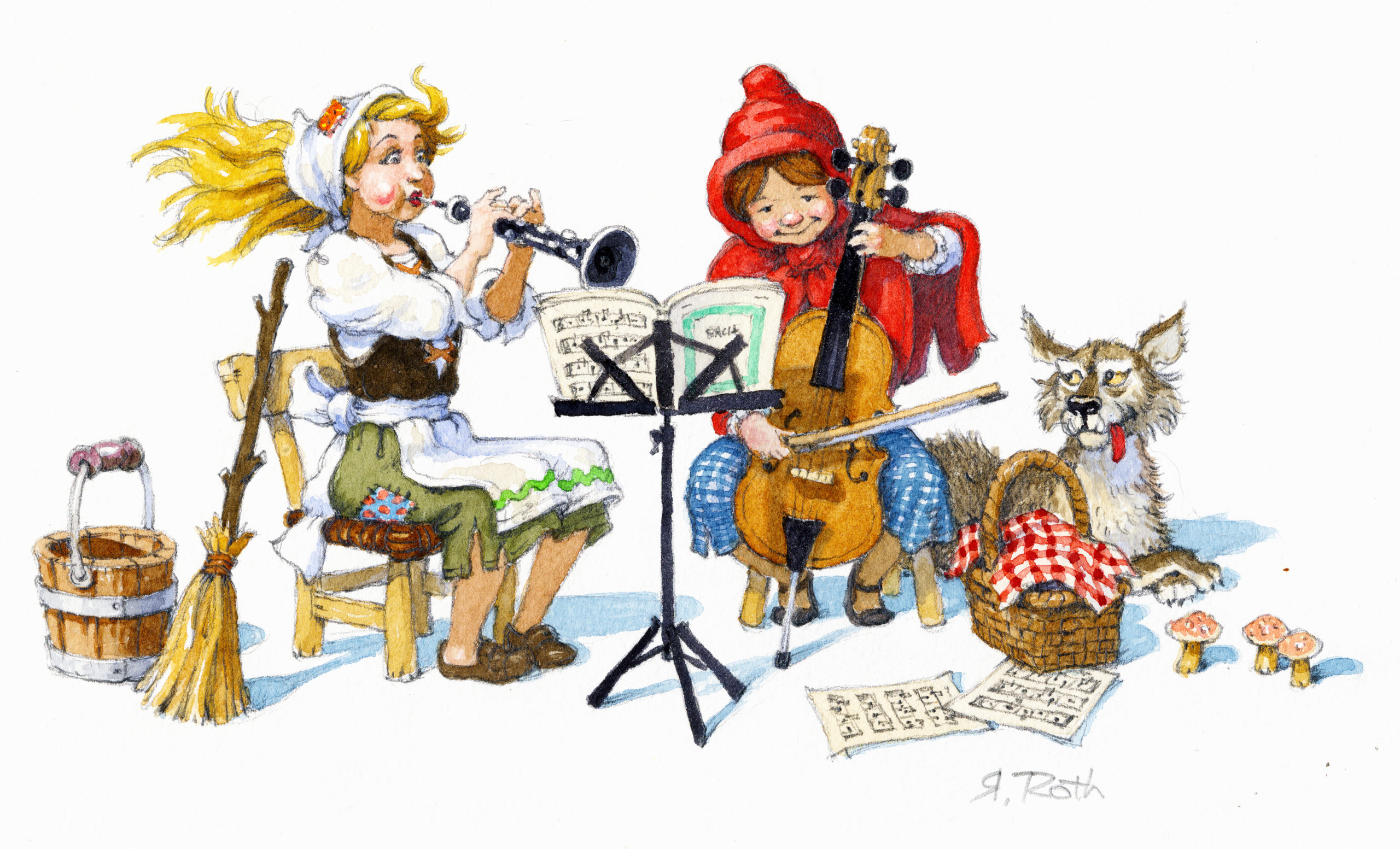CAN MUSIC TELL A STORY?
A Message from Inspector Pulse
Hi everyone and welcome back to Princeton University, one of my favorite places to play music! And speaking of music, I think that playing music is better than speaking. I understand music better than I understand words. I’ll bet you do, too. Let me try to prove it!
Pretend you are an actor with a new script. The first word you have to say is “hello”. Sounds easy, but how do you say it? When you say the word, are you excited, happy, sad, angry, nervous, silly, sleepy, frightened, laughing, crying…what?
Now, let’s say you know that your character is happy and excited. Say Hello that way. Now, say Hello as if you were sad.
What changes when you say Hello sadly instead of happily?
What’s different is the way your voice goes up or down, how fast you speak, and more. Those things are like music! So, it’s the music in your voice that tells us how you feel more than the word hello does. So, that leads me to conclude that music is more communicative than words— music tells us more than words can!
But wait. It doesn’t always work like that. For example, can a violin order a pizza? It doesn’t matter if it’s for delivery or if you are going to eat the pizza in the restaurant or in one of those outdoor gazebo things. A violin can play music that is full of emotion, and it can play Italian music (pizza is Italian food), but I don’t think a violin can actually make it clear that it is ordering pizza, let alone pizza with artichoke hearts and a gluten-free crust.
But we will investigate this question together in Richardson Auditorium and determine just what music can tell us.
And we know that the music (and sometimes words, too) will be telling us stories in this concert! I like stories, and so does my piano.
—Inspector Pulse
ABOUT THE PERFORMERS
When he was a child Bruce Adolphe watched both Victor Borge and Leonard Bernstein on TV, and after seeing them, he began “playing piano” on the breakfast table and cracking jokes with a Danish accent. Having no choice, his parents bought him a toy piano, at which Bruce pretended to be Schroeder of the Peanuts cartoons. Soon after the toy piano was pecked apart by the family parakeet, Bruce’s parents purchased a real piano and a larger bird. By age ten, Bruce was composing music, and no one has been able to stop him since. As a “tween,” Bruce studied piano, clarinet, guitar, bass, and – as a teen – the bassoon. All this time, he wrote music and improvised accompaniments to everything that happened around him, as if life were a movie in need of a score. His favorite summers were spent at the Kinhaven Music School and he loved his Saturdays at The Juilliard School’s Pre-College Division. Today, Bruce spends his time composing chamber music, playing the piano, and performing in concerts for people like you. He lives right around the corner on the Upper West Side with his wife, pianist Marija, his daughter Katja, and his opera-and-jazz-singing parrot PollyRhythm, the same bird he has had since he was 10 years old. Bruce performs weekly on public radio’s Performance Today, playing his Piano Puzzlers (familiar tunes in the styles of the great masters) and you can catch that show on WQXR or on iTunes, or as a podcast from American Public Media. Many great musicians have performed Bruce’s music, including Yo-Yo Ma, Itzhak Perlman, Joshua Bell, the Brentano Quartet, and over 60 symphony orchestras around the world, and of course lots of amazing players right here at The Chamber Music Society of Lincoln Center, where Bruce has been making music since 1992. Bruce writes books, too! You can find his book on his website (https://bruceadolphe.com/).
Oboist Liam Boisset was born and raised in the warm, sunny state of California. While he adored the beautiful scenery and laid-back West Coast lifestyle, he felt the bright lights of the city calling his name, and had no choice but to follow his dreams all the way to the Big Apple, New York City. These days, Liam thrives on the unpredictable and electrifying nature of city life, and loves chasing after that next gig like a dog with a bone. When he’s not playing oboe or making reeds, Liam enjoys strumming on his mandolin, going on long, scenic hikes, and just hanging out with his little fluffy white dog, Babu.
Kelly Hall-Tompkins fell in love with the violin when she was nine years old and has been playing it ever since. Originally from Greenville, South Carolina, her first exposure to classical music was from watching Warner Brothers cartoons, growing up in the Lutheran Church, and going on field trips to hear the local symphony. Now, Ms. Hall-Tompkins plays concerts all over the world and she is even featured in the Smithsonian Museum for African-American History! In addition to her passion for classical music, Ms. Hall-Tompkins also has a passion for languages—she can speak a total of eight languages. This comes in handy not only when she is traveling for performances, but also when helping foreign tourists in New York City, where she currently lives.
Violist En-Chi Cheng was born in the beautiful ocean city of Kaohsiung, Taiwan. Some of his favorite things about Taiwan are the fresh seafood, the big planes and ships, and the people from all over the world. He started playing viola when he was just six years old, after three months of playing the violin. Around that same time, En-Chi also did karate competitively. He even joined a rock band for five years, but not as a violist—he joined as a drummer! In 2011 he moved to Philadelphia and went to the Curtis Institute of Music to study viola and a few years later moved to New York to go to Juilliard. Although you can call him En-Chi, he also responds to his nickname that he got from a Siri auto correction error: Enchilada.
Mihai Marica started playing the cello at age 7, moments after receiving a quarter-sized cello as his birthday present. He had asked for it three years earlier according to his father, also a cellist and the inspiration behind Mihai’s desire to become a cellist, but was told that he should “play outside with the other children while he still had chance.” This turned out to be good advice, as he had to practice intensely even during his first year of study in order to perform a concerto in front of the orchestra where his father plays. Appearing on the stage of Alice Tully Hall as a member of The Chamber Music Society of Lincoln Center CMS Two program would have been beyond Mihai’s wildest dreams at age 16, when with quite a bit of luck he met Prof. Aldo Parisot, who helped him move to the United States and become a student at the Yale School of Music. In his spare time Mihai enjoys sharpening his Minecraft and Smash Brothers skills with the help of his son.
Sahun Sam Hong was born in Seoul, Korea, and started playing piano when he was four years old. Piano was not his only instrument though, he also liked practicing cello and guitar for fun. When he was eight, he moved to the United States and when he was just 16, he graduated from Texas Christian University with a degree in Piano Performance! Now, Sam plays music all over the world and he even arranges music too. His piano playing has won him many awards and his chamber music arrangements are toured throughout the country. When he isn’t playing piano, Sam loves drinking coffee, playing ping pong, and walking around the city. He also enjoys the company of his cat named Sebastian.





